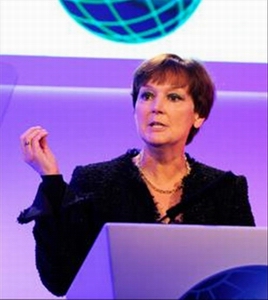 s 2013 convention in London this week.
s 2013 convention in London this week.Even though trust in food, for example, has been picking up since the horsegate scandal, the industry is under more scrutiny than ever before, said Denney-Finch.
IGD research shows that six in 10 shoppers do trust food and grocery companies to do the right thing most of the time, but 73% think it only does the right thing when it’s forced to by law or is in its own interests, she said.
“That feels like getting a C at school.”
Her speech comes in the week when wine critic Oz Clarke lambasted half-price wine deals in supermarkets on the BBC’s flagship consumer affairs show, Watchdog, and questioned whether wines being reduced by half from £10 were even worth £10 in the first place.
Denney-Finch highlighted the need for traceability. “The number of shoppers who want to know a lot about where their food comes from has grown from 34% to 56% in the past two years. But only 12% feel they do know a lot,” she said.
Further, eight in 10 shoppers believe food and grocery companies should know where every single ingredient comes from, according to the IGD.
Ethics are becoming crucial too. Denney-Finch highlighted two developments in this space: an app called Buycott, which runs a background check on the company
behind any brand to see if it contravenes a person’s ethics; and an Open University intelligent shopping trolley, which provides an ethical score for food choices.
However, while the industry has made a lot of progress on traceability it hasn’t completed the job, said Denney-Finch. “There are still gaps, too many logos, too much
small print,” she said.
Denney-Finch urged delegates to go “back to their founding values” to instill trust. She highlighted the Geowine system used by a co-operative of wine producers in south west France. It includes the use of a Bubble Tag, a unique label applied to each wine bottle, which makes them impossible to counterfeit. It provides a code that consumers enter online to find out more about their particular bottle of wine as well a geological analysis of the soil.
Consumers are also asked to rate the wine on various criteria, helping the growers optimise every part of their vineyard.
Such developments could be key in future, according to the IGD, It reports 47% of shoppers would like to restrict their purchase of food and grocery products to fully
traceable items, up from 42% three years ago.
However, perhaps the biggest benefit of transparency is confidence, said Denney-Finch.
“It’s true that a few rogue operators have tarnished our image this year but we can and we will rise above it. The people with integrity will prevail.”
Brands tend to be better trusted than industries as a whole, she said, but there was a need to keep pushing the boundaries and building trust was a long-term objective.
Denney-Finch suggested there are several steps a company can take to build trust in their brand.
The IGD tracks 13 different industry dimensions of trust from safety through quality to community relations in its ShopperVista service, which could provide a benchmark, she said.
Denney-Finch said it was critical companies knew their supply routes inside out and planned to lift their levels of traceability.
Technological advancements will have an impact, she added.
“As more and more items become tagged we’ll build an ‘internet of things’ - a complete merger of the physical and online world. Almost everything will be locatable online,” she said.
Denney-Finch offered tips for providing transparency such as web cams, touch screens and smartphones but reminded delegates traceability and transparency were
investments not overheads as well as a protection against counterfeits and fraud.
Denney-Finch highlighted the Geowine system used by a co-operative of wine producers in South West France.
It includes the use of a Bubble Tag, a unique label applied to each wine bottle, which makes them impossible to counterfeit. It provides a code that consumers enter online to find out more about their particular bottle of wine as well a geological analysis of the soil.
Consumers are also asked to rate the wine on various criteria, helping the growers optimise every part of their vineyard.
Such developments could be key in future, according to the IGD, It reports 47% of shoppers would like to restrict their purchase of food and grocery products to fully
traceable items, up from 42% three years ago.
However, perhaps the biggest benefit of transparency is confidence, said Denney-Finch.
“It’s true that a few rogue operators have tarnished our image this year but we can and we will rise above it.
“The people with integrity will prevail.”





